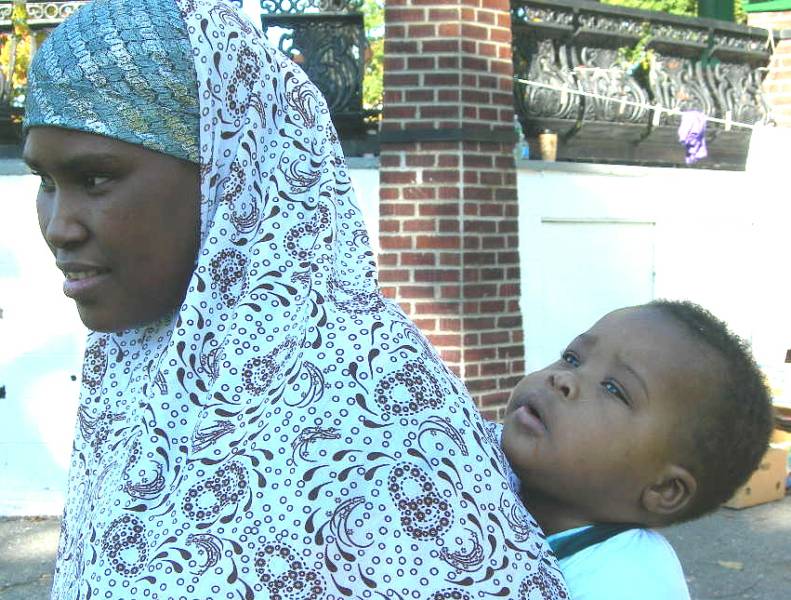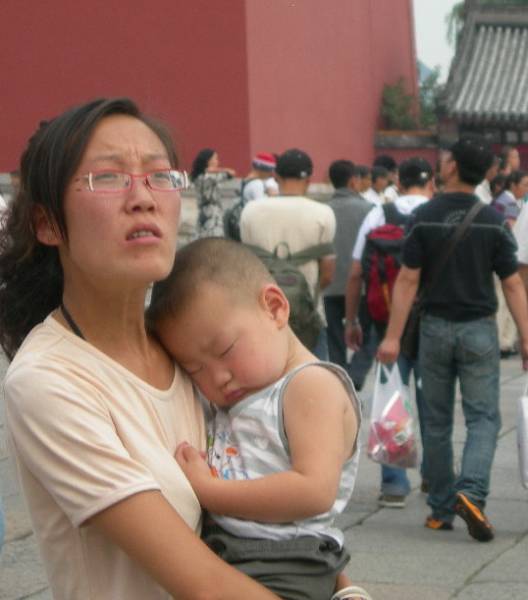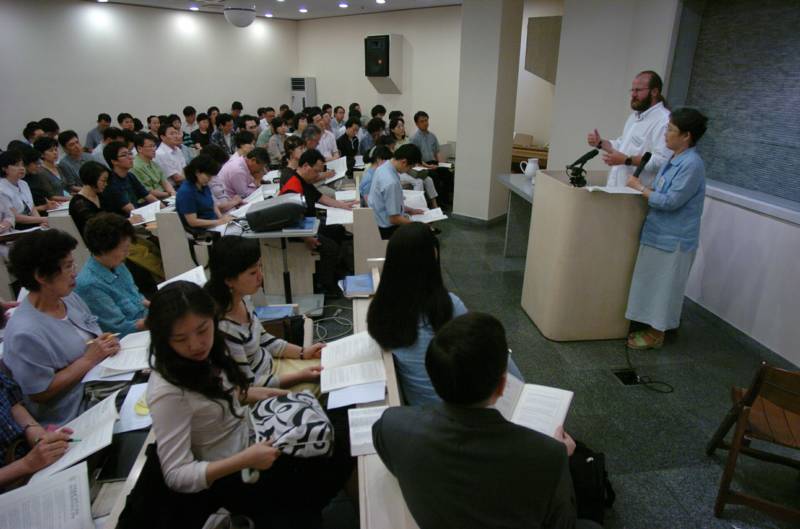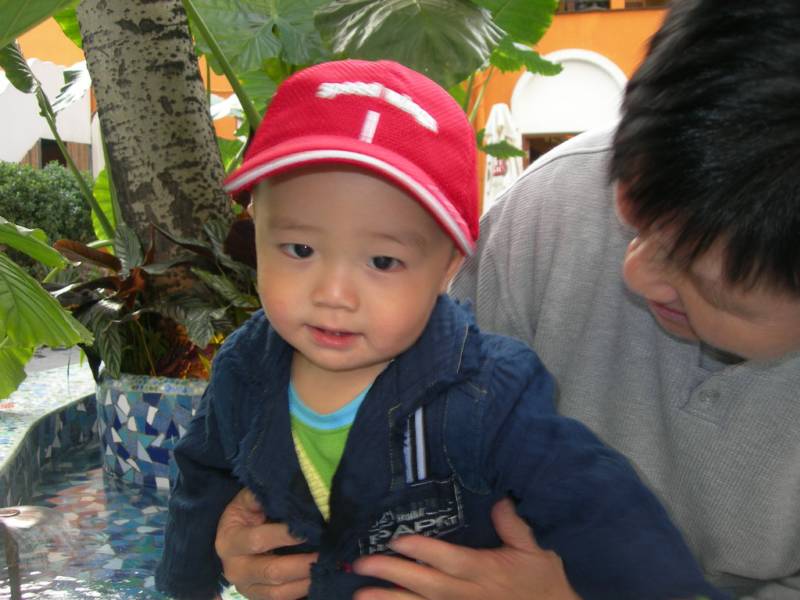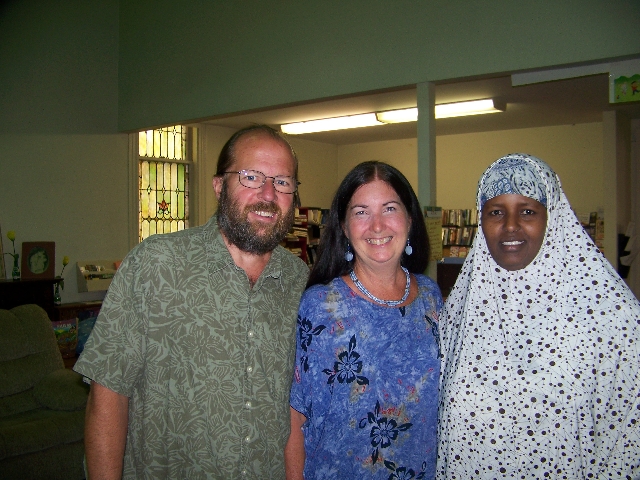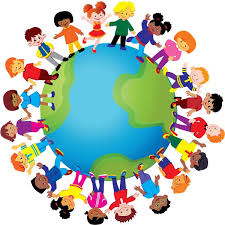What is Hope for the Nations?
In 2006, as Hope House celebrated 20 years of fruitfulness, the vision to spread hope grew wider. Just since 2006, many opportunities opened for Hope House staff to travel to other nations. Hope House sent out or supported workers to the Philippines, Korea, Thailand, Ecuador, Germany, Costa Rica, Nigeria, Uganda, and China. Hope House began more international teaming, sharing it's resources, publications, model, and workers where needs cried out and doors opened. While Hope House publications have long gone out globally, the focus on missions is a new priority.
Even in Maine, where Hope House maintains it's headquarters and continues it's ministry to needy families, the diversity of people groups has recently grown tremendously. Somali refugees now make up almost 20% of the Lewiston population, where the majority of the local work is based.
Hope Spreads to Asia
An example of the fruit of Hope for the Nations is the story of "Hope House Happy Mom & Baby Center" in Seoul, Korea. It opened in the spring of 2008 following Bruce & Jan Willson's training seminar they presented to workers with Pro-Life Korea. The center is the first and only pregnancy center in Korea, a nation with a high abortion rate, and with little help for single parents and struggling families.In 2008, Noah & Bora Willson hosted Bruce & Jan, and Sarah Willson on a tour throughout Northeast China, sharing a message of hope in a nation with a one-child policy, governmental restrictions on religion, and where a devastating earthquake had just claimed many lives. Heartwarming response to their concerts of hope stirred them to plan to go back.
The World Needs Hope
According to some studies, 98% of pro-life resources stay in the U.S., where only 3% of the world's abortions take place. And abuse to women and children is much higher in other parts of the world than in the U.S. While Hope House maintains it's local work and also reaches out nationally, the wider world's needs have reached our ears. We have heard and seen too much to ignore. We dare not hoard the hope we have been given...it is after all, HOPE FOR THE NATIONS, "that ALL the people of the earth might know" (Joshua 4:24). The world so needs "a future and a hope" (Jer. 29:11).
To support Hope for the Nations upcoming outreaches, contact: Bruce Willson, Director of Hope House and Hope for the Nations at:
Hope House
163 Elm St. Mechanic Falls, ME 04256
207-577-1165
Hope for the Nations
 | ||||||
Song for Korea video
Park Outreach video
Just Try the Sambusa!
How a neighborhood center, and it's workers, are
being revitalized by welcoming new multi-cultural
area residents
by: Bruce & Jan Willson
Maine was starting to feel like ˜The Shire" in Tolkien's ring saga a predictable corner of the world, tucked away. We, the couple who began Hope House in 1986, had moved here from the wild-west of Los Angeles, to return to New England where several generations of parents and grandparents had lived before. The quieter setting in Maine, with lower crime rates and family-oriented communities, was a welcome change. Here we raised our family of six, and we've seen our children produce beautiful new families, giving us eight grandchildren. Thank you, Maine. This has been a nice safe Shire.
And here we have spent the better part of our lives developing an idea we had for encouraging struggling families through neighborhood support. We appreciate the opportunities Maine has given us. It's just that however peaceful and comforting, the ˜Shire" can also be isolating.
Take that trip we made to Washington D.C. with our kids when they were very young. One of our children pointed embarrassingly at a black man, loudly questioning why he looked different. We realized it was the first time our son had seen a non-white person. Hmm. In our work with teens, we learned back then in the 1990s that many had never traveled out of Maine until their senior-year trip to Boston.
We decided to be more purposeful about exposing our own kids to the world outside Maine. This worked, maybe too well! All our kids soon set off on their own to Austria, Hungary, Ecuador, China, Korea, Thailand, England, and throughout Central America. They enjoy coming home to Maine, and one of our children chose to settle in Maine with his family of six. The ˜Shire" is reassuring to parents.
New Englanders are a sturdy bunch, not easily swayed, and that kind of thinking offers a measure of protection to our Maine communities. It is also what prompts business chains to try out their new products along the west coast. People out there will try anything. Perhaps Maine is not as open to things that are new and different because, after all, it's already "the way life was meant to be ".
Our time in the west had given us a certain taste for adventure. We lovers-of-31 Flavors learned that vanilla ice cream was the all-time favorite flavor of most of the people to whom we dished-out ice cream, at our Lewiston Family Support Center we'd begun in 1994. And apparently vanilla was the favorite color for people, too, in this until-recently mostly white state. In the early days of our Lewiston center, we saw a small group of black moms (there were a few in town) attempt to participate in various activities. They soon gave up, driven away by the unkind remarks of other moms attending the center.
Recently when our son's Korean wife first came to Maine, we eagerly showed her around. There was talk of them making beautiful Maine the home base for their work, and starting a family here. After all, it's a good safe place for that, right? Yes and no. Rude racist comments were made to our beautiful, gracious daughter-in-law. Actually, they were yelled to her on a street corner. No, they decided, maybe they would not raise their children here after all. And so an ocean away from here, their first baby was born.
When our organization, Hope House, celebrated it's 20-year milestone, we threw a big party and reveled in the work's effectiveness over the years, thanks to God. Recognition had come, both locally and nationally. We assumed the work would continue, without much change. Why fix what isn't broken? After twenty years we were starting to settle in, perhaps, to a ˜Shire" mentality. And we were in for a big surprise. A big, fantastic, adventure was about to happen to us.
First of all, understand that while we wanted our children to grow up with a wider world view, we on the other hand were becoming lulled by years of residing in Maine, and by the onset of our autumn years. Frankly, we were ready to put our feet up by the fire.
So it was with some surprise that we felt our hearts stirred, by needs abroad, to take new action. Travel overseas showed us firsthand the wider world's dilemmas. We discovered we could actually make a difference. We realized that what we had spent years learning how to do -- encourage struggling families -- was desperately needed in countries where there was little help available to families that were up against overwhelming circumstances.
As we began to feel a calling to reach outside of the country, we observed an amazing thing: the world was coming to Maine! In the space of ten years, refugees from war-torn places began seeking to rebuild their lives in the more secure environment of Maine. The LA Times once listed Maine as the #1 place to raise a family. Somehow, word got out. People whose families had been fractured and all-but-destroyed began pouring into the ˜Shire" from all over the world, especially from war-torn Africa.
One day, when praying for Maine, we recalled some passages about an interesting phenomenon called "cities of refuge" (Joshua 20). At that time in history, there were specific cities set up to welcome people who were fleeing for their lives from threats of violence. These cities existed to provide a safe haven.
.
That was similar to the purpose of Hope House. When we named the work in 1986, we took the name from Joel 3:16, "The Lord will be the hope of His people" -- the word "hope" meaning "harbor, place of refuge". Hope House established places of refuge in Maine for abused women, single mothers, and children at risk. Now we saw the opportunity to welcome international families needing a hand, in much the same way. In 2006 Hope House began "Hope for the Nations". A sister-center in Seoul, South Korea was opened following a training we did, and a trip to China drew our hearts to the needs there as well. But how amazing to realize that right here in Maine other nations could be offered hope. And our inner-city center fit right into Lewiston's opportunity to make a difference in the world, as a city of refuge, or a "receiving community" as they are now called., or a "receiving community" as they are now called.
The journey has taken us from shy "hello's", in the park, to awkward introductions revealing our cross-cultural ignorance, to worries that we had irreparably offended our new neighbors by our brash "ugly-American ways". It took us to the delight of meeting each other's families, to sharing meals, to seeing each other's dreams for our children, to laughing and crying together. What a joy to realize that the impossible had happened. Close friendships had formed. These did not happen overnight, but steadily grew as our hearts longed more and more to be a part of providing a safe refuge to courageous people seeking to rebuild their lives. We simply decided to learn who our new neighbors were, and how we could help. We made mistakes, but thankfully, they forgave us. Hopefully they could see our hearts were for peace.
It all began a few years ago. Kennedy Park became a place that drew us back over and over. Hope House started sponsoring family-fun events there, like a summer Baby Olympics, fall Apple Fairs, and then weekly Parents in the Park gatherings. We were drawn to get to know the diverse people groups we began meeting...we enjoyed the playful children, and the adults' wide smiles.
Over the next few years, a small but steady stream of new residents from the international community gradually sought out our center, for practical assistance. We began learning of specific needs, and started classes to respond to these needs, like our Citizenship, ESL, and Driver's Education groups. We also broadened our practical assistance to include what our new neighbors found most helpful, like adding a weekly Farmer's Market to our thrift store. Our LA Cafe Coffeehouse featured a wider variety of music, reflecting local ethnic artists. Our baby showers started including henna artists and international cuisine. We teamed with translators to bridge the language barriers, and we began learning phrases in each other's languages. As parents, we sang together, "Nabad gelyo, ilmo engeji...Safe, safe, you are safe, dry your tears."
Initially some staff and clients remained skeptical, and some scattered. But we are now seeing three times as many parents attending activities. Even many volunteers now helping to run the place are newer residents who came initially for assistance. These new residents seem eager for the chance to "give back". Most have become dear friends, as they joyfully work alongside us.
We have learned what a lot they have been through. One regular volunteer is a mother with half her family here, and half still in a refugee camp in Kenya. Her memories of being in that camp...the malnourishment, the sickness, the inability to protect ones' family and ones' self...¦those memories fuel her ever present worry for her sons and her mother, who are still there. Yet, she came weekly to our Family Support Center to help with the distribution of produce to the line of needy families. And despite all her suffering, she sings! We had seen her artistic talent already, but one morning she began to sing, with a full rich voice -- and the song was joyful and full of hope. Would she sing at our Thanksgiving Feast, we asked her? Of course, she beamed. Another Somali singer also offered to add to the music of the day.
So we piled in over a hundred people, from all over the world, for a dinner to celebrate our new-found friendships. Like the Pilgrims and Native Americans on that first Thanksgiving, we also had made it through a challenging year (of recession, of being short-staffed, short of funds, of not having enough of anything in the face of three-times the need). Like those early natives and colonists, we discovered that what we have in common is greater than our differences.
We are learning from the differences, as well. Those differences made for quite a delicious feast! We enjoyed an abundant buffet of yummy exotic and traditional Thanksgiving fare, to which all generously contributed. We had a huge surplus of more than just food...we had great JOY! New and old neighborhood residents couldn't help dancing together to lively African tunes. Everyone lingered long after the dinner, enjoying the camaraderie. Many pitched in to clean up, welcoming the chance to stretch the party a bit longer. We've sponsored years of Thanksgiving Dinners at Hope House, many said this was the best by far!
One volunteer told us "I felt like I finally experienced what Thanksgiving was meant to be. One of the songs shared that day said it well. The song went like this..."It was a most unlikely friendship, they learned that "different" could be nice! Native Americans and Pilgrims helped each other build a better life...making friends, trading smiles, meeting families, visiting awhile, sharing food, laughter ringing...neighbors making friend...that's Thanksgiving!"
What a surprise to realize and read, on the same day, in our town's newspaper, the headline story of local strife and racial tensions. How sad. They should have come to our feast. They should have tasted the sambusa (a traditional Somali "party food", which is beyond tasty). They should have danced with all of us.
Maine stands on the threshold of an amazing adventure. As some of our cities have been given the privilege, perhaps divinely-given, of being "cities of refuge", we have amazing opportunities to experience the world and to make a difference, all right at our doorstep. Some Mainers are responding admirably, leading the way, providing a model to other cities.
Some, like many of us at Hope House, are feeling energized by the experience, and deeply touched. We have been invited into internationals' homes, had them into ours, been welcomed at their special events, received beautiful exotic gifts, called "family" by many. And personally, we found that the autumn of our years has brought us the best adventures of all. The refugees' stories of struggle have made us aware of our blessings, their generosity in the face of their lack has humbled us, and the joy of sharing friendship and resources with them has brought new meaning to our lives.
The privileges of citizenship take on new meaning seeing what one African family has gone through to be here. We attended Boston's immigration court to stand by their side, and make sure none of them were sent back into violence. Sharing our 4th of July celebration with them gave new meaning to the freedom we take so for granted.
Attending a young African girl's high school graduation was another special privilege...seeing her be awarded for her high achievement...and being privileged to be counted among her close friends. Being invited to a little African girl's 4th birthday -- a little girl whose survival is somewhat of a miracle -- was a special honor. There was much joy that day, coupled with sorrow that the violence in Mogadishu had recently claimed the life of a relative of her and her family's. They showed us pictures of the recent violence at a website and wanted us to understand what they were feeling that day...an odd mixture of joy, touched by pain. We are inspired by the tenacity of our new neighbors, and their zest for life despite all the sorrow they have seen.
Recently, a long-time resident and client mom for many years complained, "Hope House sure has changed!" She echoed the sentiment of some here in the "Shire"...to keep things the same, to keep dishing up vanilla. How boring, we say. There are lots more than 31 flavors out there...over 50 different nations are now represented in our small city. It's time to seize the day, to embrace this rare opportunity. Who,d have thought we'd be dancing to Somali music at Hope House, and feeling more alive and more grateful than ever before?
So to those in Maine still cautious and holding back, still hesitant to come to the party, we say it's time...time to try the sambusa!
© Bruce & Jan Willson 2010
Recommended Resources
- "The Somali Diaspora", by Abdi Roble and Doug Rutledge
- "Somalis in Maine: Crossing Cultural Currents
- "Welcome to Shelbyville" (video)
- "The Letter: An American Town and the 'Somali Invasion'", (video)
- "Muslims, Christians, and Jesus", by Carl Medearis (book and video)
- "Allah: A Christian Response", by Miroslav Volf
- "Welcoming the Stranger", by Matthew Soerens & Jenny Yang
- "For Sama" (video)
- "Foreign to Familiar", by Sarah Lanier
- "Teatime in Mogadishu", by Ahmed Ali Haile
- "Tea With Hezbollah", by Ted Dekker and Carl Medearis
- "Rain in a Dry Land" (video)
- "A Deadly Misunderstanding", by Mark Siljander
- "Pilgrims of Christ on the Muslim Road", by Paul-Gordon Chandler
- "Waging Peace on Islam", by Christine Mallouhi
- "Speaking of Jesus", by Carl Medearis
- "Do We Worship the Same God?", Miroslav Volf, editor
- "Healthy Moms, Healthy Babies II: Information for Somali Families" (video)
- "Trauma and Recovery", by Judith Lewis Herman, M.D.
- "Left To Tell", by Immaculee Ilibagiza
In 2001, Hope House's 15th year in Maine, an interesting thing happened. Somali refugees began arriving in Lewiston, the city where Hope House operates an outreach center. In just ten years, the depressed mill town with a declining population became revitalized with about 6000 new Somali neighbors that made up close to 20% of the previously 96%-white town. Availability of housing, good schools and a safe family environment drew not just Somalis, but increasing numbers of other African refugees and immigrants fleeing violence in their homelands. Most Somalis coming to Maine were secondary migrants choosing to relocate from where they had been initially resettled in areas like Atlanta, because they had felt unsafe due to gangs and crime. Safety, especially for raising children, was paramount to refugees who, unlike immigrants moving to the U.S. for economic opportunities, were fleeing war and harsh refugee camps So it was disconcerting to have Lewiston's Mayor Raymond in 2002 tell new Somali arrivals to cease further migration to Lewiston's economically strained city. His letter received international media attention, and greatly escalated tensions for the 1,100 new Somali neighbors facing fear and uncertainty. While some of Lewiston's leaders have welcomed new international residents admirably, some continue to fuel tensions surrounding racial and religious differences. Into this swirling drama, Hope House has been thrust. What we have experienced may be relevant and timely for others.
The U.S., along with many other nations, is experiencing an unprecedented global flow of refugees reflecting a predominance of Africans, Muslims, and women and children. Most of these have witnessed many horrors and suffered great losses. Somalis in particular, whose civil war has been creating turmoil since 1991, have now been resettled into almost every U.S. state (except for seven). While Lewiston's situation is unique in that it has the highest percentage of Somalis of any U.S. city, the challenges of receiving communities are becoming more common. Perhaps our story can be of help to other people also learning the joys and challenges of welcoming cross-cultural neighbors in their own backyards.
Welcoming Cross-Cultural Neighbors
Afterword
In the last three years, the volunteer staff of the Lewiston center has experienced a turnover. As the center's population became increasingly diverse, the majority of long-time volunteers dropped out for various reasons. Some were unwilling to accept the changes. They were gradually replaced by a new crew made up of both new and old residents who have been building friendships. While the new volunteers have stepped up to oversee many part-time duties, a need for more seasoned and trained workers/leaders continues to be great. Response to this need is being met in part through seasonal help, coming from other states and even other countries, as we have hosted large and small teams sent out to assist us.
The challenges we have recently faced are somewhat understandable, as long-time locals have struggled to embrace the wider worldview from which Maine had become curiously isolated. At one time a cotton mill in Lewiston was Maine's largest employer, with 6000 employees. Perhaps isolation set in over the last 30 years, as Lewiston struggled with poverty due to all it's mills closing, along with neighboring Auburn's shoe factories. Lewiston's new arrivals became scapegoats on which residents could focus their growing frustrations over their harder times. But the facts show that the new residents are actually energizing the economy, contributing to a safer family environment, and fueling a social renaissance.
Perhaps the greatest challenges native Mainers have faced are due to differences in faith. Almost all Somalis are Sunni Muslims. They came into Lewiston the very year of 9/11, into a place which had had very little exposure to Islam prior to that. Yet even though the challenges for both new and old residents have been considerable, Lewiston is a city with a rich immigrant history. Founded in 1795 by the English Protestants, Lewiston experienced a large influx of Irish Catholic immigrants in the 1840's who were met with racial and religious prejudices that sadly resulted in Lewiston's first Catholic church, built by Irish immigrants in 1855, being burned down. In 1860 a wave of French Canadians began immigrating to Lewiston, until they represented 56% of the town's population by 1900. At first the French were discriminated against as well. But Lewiston's native residents are realizing that most of us came from somewhere else, and each new group has brought rich cultural flavors that have enhanced our community, and our country.
Hope House is honored to have participated in "Welcoming Maine" efforts, and Hope House directors have signed Lewiston Mayor Gilbert's proclamation that Lewiston be a welcoming city to all newcomers. Along with Mayor Gilbert, and our Somali friends, we (Bruce & Jan) were invited to attend a reception to celebrate the successful democratic election of the new president of Somalia, whom the U.N. supports. It was an historic party, with the room of Somalis waving American flags along with the flag of Somalia.
Mayor McDonald, Lewiston's mayor after Mayor Gilbert, has said that immigrants should "leave their culture at the door" when they come to America, and his negative comments fueled lingering tension in town. Evidence of that is seen in our financial struggles. Since opening our doors wider to the refugee population, local financial support has decreased by 1/3 of what it had been. God has been faithful to sustain us. We pray He raises up more who team with us by investing in our center's call to love God and our neighbors, as Jesus told us all to do.
A Muslim Letter, "A Common Word Between Us and You"
Brings Hope for the Nations
From Amman, Jordan, a surprising and gracious invitation has been made by Prince Ghazi and 138 other prominent Muslim leaders, to the leaders of Christian groups everywhere: "...we as Muslims invite Christians to come together with us on the basis of what is common to us..." The letter describes the two commandments of love that both our faiths share, that of love for God and love for neighbor. It challenges us to "make every effort to make peace and live together in harmony"..."If Muslims and Christians are not at peace, the world cannot be at peace...the very survival of the world itself is perhaps at stake". These Middle Eastern scholars point out that our faiths, which include the world's two largest faith communities, share essential common values that can be a bridge between us, for the good of the world.
The letter, published on Oct.13, 2007, is called "A Common Word Between Us and You". It continues to garner support, as Christians are increasingly learning of it and signing on to various letters of response.
Hope House's directors have signed a well-written Yale response, stating agreement with the Common Word's appeal for peace between Muslims and Christians.
To read the Common Word letter itself, visit Common Word
To read the Yale response, visit Yale
Pray that this tangible hope for the nations grows! Encourage a Christian leader you know, to add their name to one of the recent responses. And recommit yourself to living out Jesus the Christ's commands to love God and love your neighbor, so that peace among nations can be a reality.
Here are two examples of Muslims and Christians loving their neighbors
A Christian's Ramadan Prayer
As my friends call to You,
As they fast all month through,
May their longings touch Your heart,
May Your mercy be imparted
Morning, night, and noon...
See their deep devotion to You.
You satisfy the hunger of each soul,
All creation You uphold.
Your amazing goodness we all share,
I lay my passion for You next to theirs...
You answer the cry of humble prayer.
As my friends call to You,
As they fast all month through,
Bless their families with health,
Come reveal more of Yourself
In dreams and hope anew,
As my friends call out to You...
As my friends call out
My heart, too, bows down
As my friends call out to You,
As my friends call out...
To You.
(c) 2013, Jan Willson
Hope House was invited to attend a gathering at the Lewiston Library to hear Stephen Schwartz (seen at right), U.S. Ambassador to Somalia. Bruce shook his hand and thanked him for visiting the Somali community here. Check out more about his visit to Lewiston in the Sun Journal.
"The best friends may come
From around the world,
A treasure to find,
What a delight!
Friends are two hearts
Blending into a song.
So sing with me , my friend,
Maybe our song will spread!
Sing to the world again and again
How God has made us friends."
Baby Pemba and Jan Willson co-wrote "Friends". Together they sing a vision of hope for the world. Hear more of Baby's music.
We so appreciate the help of Talal Karam, who served us as an Arabic translator and helped out at or Family Support Center in 2017,
